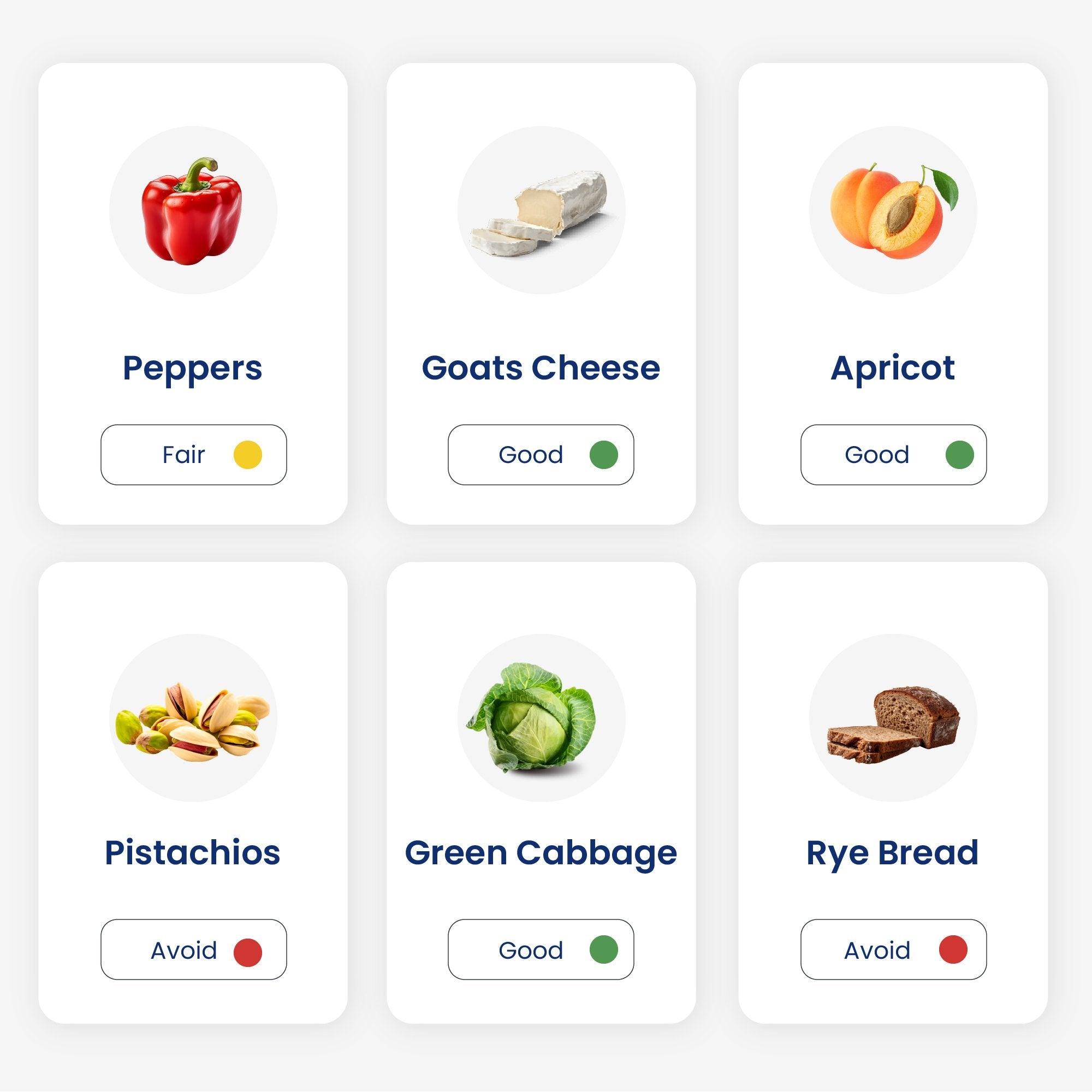
Medically reviewed by Kate Hilton RD
On 2 May 2024
Our gut plays a leading role in our overall health, from assisting our body with digestion and weight management to boosting our immune system and mental health.
The use of probiotics and prebiotics are key components that help to support a healthy gut; but what are they and how do they help? Our guide looks at the key differences between the two, how they support our health, when and how we should take them and how to identify when you need them.
What are Prebiotics?
Prebiotics are compounds found in some of the foods we eat that help to nourish and feed the good bacteria in our gut. Interestingly, prebiotics cannot be digested by our body; instead, when we consume them, they make it all the way to our colon (large intestine) where our gut bacteria feed on them and ferment them.
During the fermentation process, our gut bacteria produce substances that are essential to our overall health and improve our immunity, mental health, metabolic health, and digestion, called short-chain fatty acids (SCFAs).
The purpose of prebiotics is to feed the good bacteria in our gut, helping to improve our gut health and consequently overall health.
Sources of Prebiotics
Foods that contain prebiotics include:
- Garlic
- Onions
- Leeks
- Soybeans
- Asparagus
- Bananas
- Barley
- Oats
- Apples
- Cocoa
This list is not exhaustive; there are also many other foods which are great sources of these prebiotics.
Source - https://www.ncbi.nlm.nih.gov/pmc/articles/PMC6463098/
What are Probiotics?
Probiotics are live microorganisms that live within our body and help to maintain and improve our overall health which we introduce to our body via food or supplements. Supplements and additional sources of probiotics are essentially adding to the already existing numbers of healthy bacteria that currently live within our body and help to increase their numbers.
Probiotics are primarily found in fermented foods such as yoghurt, kefir, sauerkraut, and kimchi, but can also be consumed in supplement form.
Common Probiotic Strains
The most well-known probiotic strains include:
- Lactobacillus species: Commonly found in yogurt and other fermented foods. Useful in treating diarrhoea and may help with lactose intolerance.
- Bifidobacterium species: Found in dairy products. Bifidobacterium is considered a beneficial gut bacteria and can help alleviate symptoms of irritable bowel syndrome (IBS) and other conditions.
- Saccharomyces boulardii: A type of yeast that can significantly reduce the symptoms of acute diarrhoea and other digestive problems.
When looking for foods that contain probiotic strains, it’s important to choose foods that specify “live and active” cultures on the product label, as probiotics can be destroyed during food processing.
Source - https://ods.od.nih.gov/factsheets/Probiotics-HealthProfessional/
What is the Difference Between Probiotics and Prebiotics?
Whilst both probiotics and prebiotics are integral to our overall health, they get to work in different ways.
- Probiotics: are helpful living organisms that add to the already existing population of helpful organisms living within our gut. They are typically found in certain fermented foods or supplements.
- Prebiotics: Prebiotics on the other hand, are the food to help nourish the helpful living organisms within our gut and encourage them to grow in numbers.
In a nutshell, the main difference lies in their function; probiotics are actual live bacteria, whereas prebiotics are food for these bacteria.
What Can They Help With?
Probiotics and prebiotics can help to increase our overall gut health, but the benefits of a healthy gut can be felt throughout the body.
- Digestive function: Improving symptoms of irritable bowel syndrome (IBS), constipation, and diarrhoea.
- Immune function: Enhancing the immune system's ability to fight infections and inflammation.
- Mental health: Evidence now shows a link between gut health and mood disorders such as anxiety via the gut-brain axis.
- Gut dysbiosis: Probiotics and prebiotics help to increase the diversity of microorganisms within the gut by helping beneficial bacteria to grow in numbers, thus, reducing the risk and helping to fix a gut imbalance.
When Should I Take Them?
The timing of when to take probiotics and prebiotics can depend on several factors, including the reason for usage and individual health conditions. However, general guidelines suggest:
- Probiotics - If you are taking probiotic supplements, they will need to be taken daily for months to achieve the best results. Typically, you can stop taking these after 3-6 months of continual use, as you will have reinstated a healthier gut microbiome by this stage. Some probiotics may work better with or without food, depending on the brand of probiotics that you choose, this will be documented on the dosage instruction label.
- Prebiotics - They can be taken at any time as they are not affected by stomach acid.
Essentially, the timing of when to take probiotics and prebiotics comes down to personal preference and what works for you. If you are taking your probiotics and not experiencing any side effects, you should remain consistent and continue to take them at that time.
How Should I Take Them?
Probiotics
- Supplements - If you are taking a probiotic supplement, please ensure that you follow the manufacturer guidelines regarding dosage. Probiotic supplements will be available in different strengths and will contain different strains, reading the manufacturer information leaflet will provide you with insight into the quantity, frequency, and timing they should be taken at.
- Foods - Probiotics can be consumed through fermented foods like yogurt, sauerkraut, and kimchi. You should consume probiotic rich food as part of a wider balanced diet.
Prebiotics
- Supplements - Prebiotics can be incorporated into the diet through food sources or as supplements. Reading the manufacturers' information leaflet should provide you with guidance on when and how to take your supplement.
- Foods – Incorporate prebiotic rich foods into a wider balanced diet that also contains probiotic rich foods. Incorporating both prebiotic and probiotic foods alongside a balanced diet will increase the diversity of the bacteria within your gut, something that is key to gut health.
Can I Take Them Together?
Yes, taking probiotics and prebiotics at the same time is completely fine, in fact; some supplements contain a combination of probiotics and prebiotics in one supplement, often called “Synbiotics”.
Who should not take them?
It is typically recommended that people who are immune compromised (for example, those on chemotherapy, taking immunosuppressants or with certain types of cancers) should not take probiotics without discussing with their healthcare team first. This is because there is a slightly elevated risk of other, non-beneficial bacteria being present within the probiotic, which can be too much for a compromised immune system to manage.
Those with any form of condition which affects the GI tract (including IBS, IBD and diverticular disease) should speak to a professional before significantly increasing consumption of prebiotics, as these can make the symptoms of these conditions worse in large quantities.
Do probiotics need to be stored in the fridge?
Yes, some probiotic strains will need to be stored in a fridge, whereas others can be stored at room temperature. Storage advice will be included on the manufacturers label, so please ensure you read thoroughly.
Bitesize summary
Remember that probiotics and prebiotics work best as part of a healthy balanced diet that should consist of a wide variety of gut friendly foods that all contribute to improving your overall health. There is no doubt that probiotics and prebiotics are hugely beneficial to our gut, however; if you have been diagnosed or are suffering from digestive symptoms, it may be best to introduce them into your diet under the guidance of a registered dietitian.



